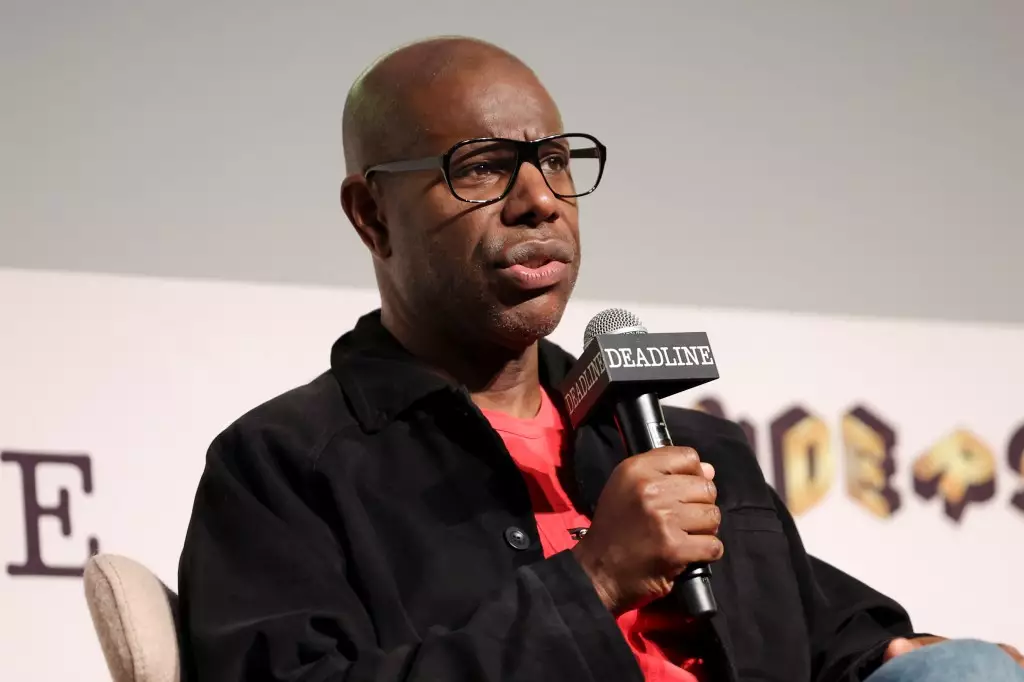In the landscape of cinematic storytelling, World War II remains a dominant theme, captivating filmmakers for over eighty years. Each new portrayal strives to bring fresh insights into the monumental conflict that reshaped civilizations. This ambition is notably embodied in Steve McQueen’s latest project, “Blitz,” which invites audiences to experience the war through the innocent eyes of a child. McQueen’s approach challenges dominant narratives that often neglect the purity of childhood experiences amidst the complexities of adult emotions and motivations. By focusing on the perspective of a young boy, McQueen ventures into uncharted territory, suggesting that perhaps the most authentic responses to monumental events lie not in political debates, but in the simplicity and honesty of a child’s curiosity.
The film revolves around George, a nine-year-old boy navigating the chaos of wartime London. His mother, Rita, portrayed by Oscar-nominated actress Saoirse Ronan, makes the difficult decision to send him away for his safety. Though the circumstances are grave, George’s spirited defiance embodies the innocence and resilience often associated with childhood. McQueen notes that our adult perspectives can often become monotonous through the accumulation of experiences that dull our innate curiosity. By returning to the essence of a child’s viewpoint, “Blitz” promotes a necessary reevaluation of what we consider important in the aftermath of horror. The filmmaker reflects on how moments of innocent wonder can evoke more profound truths about our existence, urging viewers to confront when and how they allowed their curiosity to fade.
The film doesn’t merely tell a story; it attempts to tap into the emotional repository that resides in our shared memory of history. Through George’s adventures, viewers are invited to experience the tension of conflict intertwined with the fleeting moments of childhood wonder. McQueen’s inspiration came from a photograph of a child preparing for evacuation—a moment that encapsulates both fear and hope. The decision to tell this story from a child’s perspective is deliberate, intended as a method to ground the narrative in authenticity. It envisions how the events of World War II could be revisited from a fresh angle, unlocking layers of emotional depth often overshadowed by stark historical discourse.
For Ronan, the commitment to authenticity extended beyond the script. Her preparation included working with a dialect coach to master the Cockney accent prevalent among London’s working class during the 1940s. Such attention to detail is critical for actors wishing to encapsulate historical settings convincingly. Ronan’s efforts highlight a broader dedication to attribute significance to the characters that represent the struggles of their era. By comprehending how this accent, along with the attitudes and domestic roles of women during the war, shaped interpersonal interactions, Ronan informs her portrayal with a sense of agency and awareness. This dedication aids not only in character development but also adds a layer of historical credibility that enriches the viewing experience.
“Blitz” ultimately serves as a reminder that stories have the power to shape our understanding of history. By framing the narrative through the innocent eyes of a child, McQueen disrupts the traditional portrayal of war, allowing viewers to partake in a journey laden with curiosity and vulnerability. The film endeavors to evoke emotions that surpass mere entertainment, aiming to foster remembrance and reflection on humanity’s shared past. In challenging adults to reconsider when they became desensitized, McQueen’s work highlights the importance of engaging with history not just as a series of events but as a tapestry woven with compassion, hope, and resolve.
Both McQueen and Ronan showcase how innovative storytelling can reignite our connection with history through the lens of innocence, offering an enlightening perspective that encourages a deeper exploration of both war and childhood. The result is not merely a film but a poignant commentary on the human experience during times of unprecedented strife. As “Blitz” prepares to sweep audiences into a world of past trials and tribulations, it serves as a potent reminder of the enduring power of curiosity and compassion amid chaos.


Leave a Reply